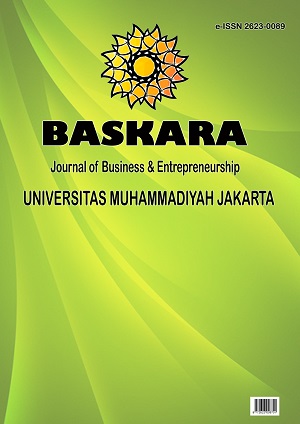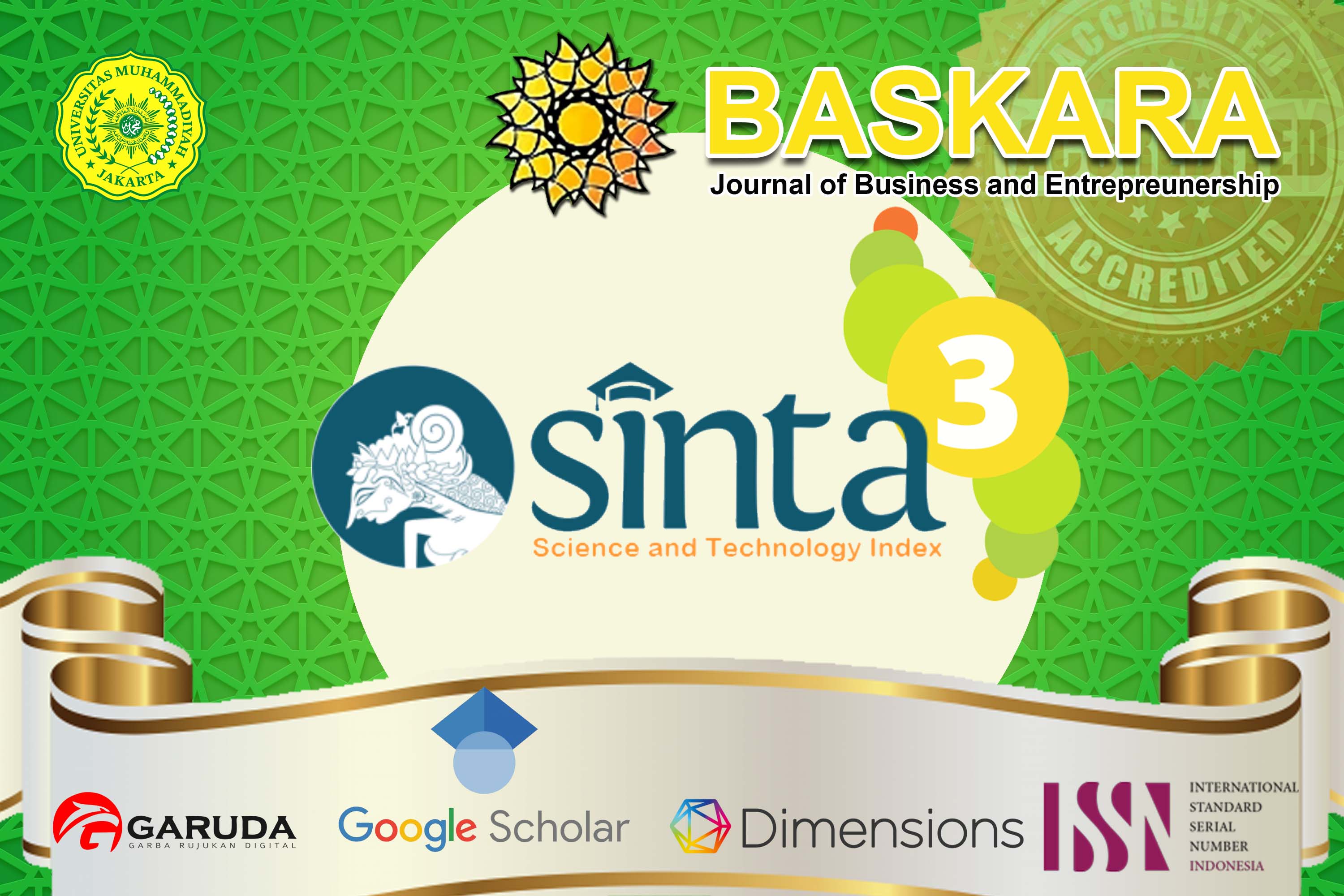The Determinants of Profitability In Processed Food Industry In Indonesia
DOI:
https://doi.org/10.54268/baskara.v4i2.10980Keywords:
Working Capital, Sales Growth, Debt to Equity, Operating Efficiency Ratio, Return On EquityAbstract
The main purpose of this study is to explore the impact of working capital, sales growth, debt to equity, and operating efficiency ratio on the profitability of processed food industry in Indonesia. The profitability in this study is measured through return on equity (ROE). The research is a quantitative research method by using secondary data for seventeen processed food companies listed in Bursa Efek Indonesia from 2013 until 2019.The research shows:1) working capital has significant positive effect on processed food company’s profitability; 2) Sales growth has significant negative effect on processed food company’s profitability; 3) the debt to equity or leverage does not have any effect on processed food company’s profitability, 4) operating efficiency ratio has significant negative effect on processed food company’s profitability.References
Anarfi, D. & Danquah, K. A. B. (2017). Determinants of Return on Equity in the Czech Agric and Forest Industry. Journal of Innovative Research in Business & Economics - ISSN - 2456-7868 Vol. 1, Issue 1, Page 01-49, April 2017
Bobby Chandra and Dadan Rahadian (2019). Factors Affecting Profitability of Retail Company in Indonesia with DUPONT Model Approach. In Proceedings of the 2nd International Conference on Inclusive Business in the Changing World (ICIB 2019), pages 136-142
Dong H.P., Su J., 2010. The relationship between working capital management and
profitability: a Vietnam case, International Research Journal of Finance and Economics, issue 49
Fitri, M.C, Supriyanto, A & Abrar. (2016). Analysis of debt-to-equity ratio, firm size, inventory turnover, cash turnover, working capital turnover and current ratio to profitability company. Journal Of Accounting, 2(2), 1-15
Ginting, W.A. (2018). Analisis Pengiran Current Ratio, Working Capital Turnover, and Total Asset Turnover Affect Return on Asset, Jurnal Ilmiah Valid, 15(2), 163-172. Hermuningsih, S. (2012). Pengaruh Profitabilitas, Ukuran Terhadap Nilai-Nilai
Jacinta Winarto, 2015, The Determinants of Manufacturer Firm Value in Indonesia Stock Exchange, International Journal of Information, Business and Management, Vol. 7, No.4, 2015
Ukaegbu, B. 2014. The significance of working capital management in determining firm
profitability: Evidence from developing economies in Africa. Research in International Business and Finance, 31, 1-16.
Vithessonthi, C., Tongurai, J. 2015. The effect of firm size on the leverage–performance
relationship during the financial crisis of 2007–2009. Journal of Multinational
Financial Management, 29, 1-29. doi: https://dx.doi.org/10.2139/ssrn.2285980.
Downloads
Published
Issue
Section
License
In order for Baskara: Journal of Business and Entrepreneurship to publish and disseminate research articles, we need publishing rights (transfered from author(s) to publisher). This is determined by a publishing agreement between the Author(s) and Baskara Journal. This agreement deals with the transfer or license of the copyright of publishing to Baskara: Journal of Business and Entrepreneurship, while Authors still retain significant rights to use and share their own published articles. Baskara : Journal of Business and Entrepreneurship supports the need for authors to share, disseminate and maximize the impact of their research and these rights, in any databases.
As a journal Author, you have rights for a large range of uses of your article, including use by your employing institute or company. These Author rights can be exercised without the need to obtain specific permission. Authors publishing in Baskara : Journal of Business and Entrepreneurship have wide rights to use their works for teaching and scholarly purposes without needing to seek permission, including:
- use for classroom teaching by Author or Author's institution and presentation at a meeting or conference and distributing copies to attendees;
- use for internal training by author's company;
- distribution to colleagues for their reseearch use;
- use in a subsequent compilation of the author's works;
- inclusion in a thesis or dissertation;
- reuse of portions or extracts from the article in other works (with full acknowledgement of final article);
- preparation of derivative works (other than commercial purposes) (with full acknowledgement of final article);
- voluntary posting on open web sites operated by author or author’s institution for scholarly purposes.
Copyright Transfer Agreement for Publishing (Publishing Right)
The Authors who submit manuscript has to understand that if accepted for publication, mean that all copyright and publishing right of the article shall be assigned/transferred to Baskara: Journal of Business and Entrepreneurship as assigned publisher.
- CC BY-NC: This license allows reusers to distribute, remix, adapt, and build upon the material in any medium or format for noncommercial purposes only, and only so long as attribution is given to the creator.
It includes the following elements:
BY ![]() – Credit must be given to the creator
– Credit must be given to the creator
NC ![]() – Only noncommercial uses of the work are permitted
– Only noncommercial uses of the work are permitted
Baskara (C) Copyright (2022):
BASKARA: Journal of Business and Entrepreneurship by https://jurnal.umj.ac.id/index.php/baskara
is licensed under a Creative Commons Attribution-NonCommercial 4.0 International License








